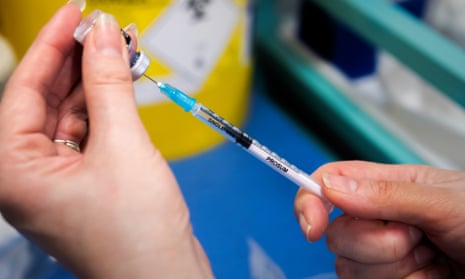Public Health England is to step up its surveillance of a highly transmissible variant of coronavirus that arrived in the UK after fuelling a surge in the number of cases in South Africa.
The new variant was detected in the UK shortly before Christmas when health authorities tested two people who became infected following contact with separate travellers from the country.
Scientists are particularly concerned about the South African variant, named B1351, because it appears to be more transmissible than previous forms and may offer some resistance to vaccines.
At least 29 cases in the UK and three in Ireland have been recorded, but some infections may have been missed because only a fraction of viruses from positive tests are sequenced to monitor their mutations. The majority of cases with the South African variant are people returning from the country.
Public Health England already tracks the highly infectious UK variant of coronavirus, known as B117, but this is fairly straightforward. NHS tests for coronavirus check for the presence of three viral genes, but a key mutation in B117 means only two are detected. Tests that spot the two genes but are missing the third are then used to trace the virus around the country.
The Office for National Statistics publishes the latest tracking data for the B117 variant in its weekly Covid infection reports, but cannot yet distinguish cases of the South African variant from other coronavirus infections. Public Health England is working with the Covid-19 Genomics UK (Cog-UK) consortium to trace the South African variant by examining whole genomes of Covid viruses obtained from positive swabs.
The move comes as Japanese authorities investigated four people who arrived from Brazil on 2 January carrying another new variant.
Japan’s National Institute of Infectious Diseases said the Brazilian and South African variants have two mutations in common. One, called N501Y, is thought to make the virus more infectious and is also found in the UK variant. The other, E484K, appears to confer some resistance to antibodies collected from former Covid patients and may have an impact on vaccines.
On Sunday, researchers in South Africa reported the first known re-infection with a coronavirus carrying the E484K mutation.
Nick Loman, professor of microbial genomics and bioinformatics at the University of Birmingham, and a member of Cog-UK, said: “It’s notable that several different variants have emerged recently with similar and overlapping mutations, for example in Brazil and South Africa. These ‘mutational constellations’ suggest the virus is taking different evolutionary paths to similar outcomes, and the big question is what advantage might these mutations confer.
“These variants are often detected in places with the highest rate of genome sequencing, so we would expect similar variants to be detected regularly in other countries. Over the coming months we should get more clarity about the importance of these different variants in terms of important features of the virus including transmissibility and antibody resistance.
“One key open question is whether any of these variants increase the rate of reinfection. At the moment the data is very patchy on this partly because of the difficulty of getting really good reinfection data.”
